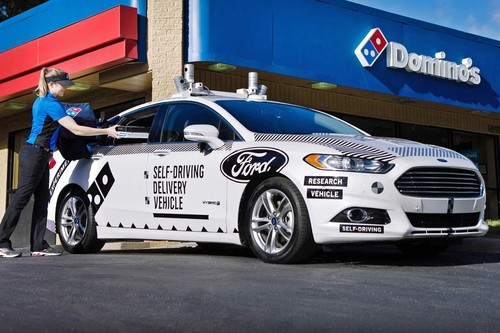And not just for self-driving cars

And not just for self-driving cars
Ford is using artificial intelligence across the business: in autonomous vehicles, car design, and even in HR. It also wants customers to talk to their cars.
The automotive manufacturer’s CTO, Dr. Ken Washington, detailed several major AI projects currently underway, during a keynote at this year’s virtual AI Summit Silicon Valley.
Driving AI forward
The obvious application for artificial intelligence in the automotive sector is in self-driving cars, with Washington explaining how Ford used multiple technological approaches to expand its autonomous capabilities.
First, the company uses real-world data to train the system, racking up miles and miles in autonomous testing. But to really train a system, you need more data, and better control over that data – enter synthetic data.
"What we did was combine real world data with simulated data from gaming engines, and you can see that the vehicle did a much better job of identifying the road markings," Washington said.
"Unfortunately, it also came with some false positives. This is where advanced techniques like generative adversarial networks come into play, where we were able to get the advantage of the simulated data combined with real world data, but avoid the false positives."
The company is also developing AI techniques to identify the free space around the vehicle, as well objects in its environment so it knows how to navigate safely around those. "This is the task of perception, where we detect and we track the things that are in the world. But we also do prediction," Washington said. "Not only do we need to detect and track but we need to predict where things go."
He added that the company was developing deep neural network capabilities to automatically classify objects, "so that we know not only that it's there, but we know whether it's a person, a vehicle, a tree, a dog, some other kind of animal. And then that'll help that helps us predict how to safely navigate in the world."
Washington admitted that most customers won't experience a fully automated, Level Four self-driving system anytime soon. But much of this technology is already being integrated into driver assist tech, making driving easier and safer.
AI systems are being used by Ford to improve functionality beyond driving. A subsection of the tech could be used to help the vehicle communicate. Envisioning an almost Knight Rider-esque future, Washington said that "natural language understanding [means you could be] talking to your vehicle like you will talk to your friend, or your neighbor, or your family."
For example, you could ask: how far can I drive in a full tank of gas with my F-150? How often do I need to change my oil? "This isn't science fiction, you will be able to do that in our upcoming vehicles in 2021,” Washington said. “But that's just the tip of the iceberg."
The first applications of AI in a car occur before it even leaves the factory. "In the past, we used humans to detect anomalies in our manufacturing process," he said. "We've put artificial intelligence to work, combined with advanced cameras to automatically detect defects. And it turns out that when using these machine learning techniques in this setting, we can detect defects that humans have missed in the past."
Washington added: "In the future, we're going to see it change how we interact with the interior of our vehicles. We're even going to see how smart connected propulsion systems or home energy management systems can be propelled and enabled by AI to do things that we can't imagine today."
There are smaller, perhaps less headline, AI-based efficiencies that can be found elsewhere. "In our human resources applications and in our legal applications, we're applying it to do smart document management," Washington said. "I couldn't be more excited about what the future holds."
About the Author(s)
You May Also Like
.jpg?width=700&auto=webp&quality=80&disable=upscale)
.jpg?width=700&auto=webp&quality=80&disable=upscale)
.jpg?width=700&auto=webp&quality=80&disable=upscale)


.jpg?width=300&auto=webp&quality=80&disable=upscale)

.jpg?width=300&auto=webp&quality=80&disable=upscale)